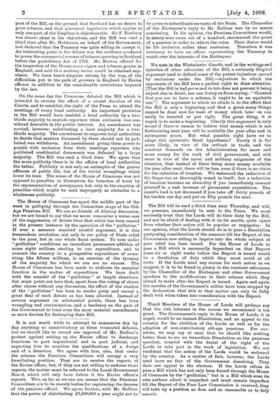On the same day the Commons debated the Bill which
is intended to reverse the effect of a recent deciiion of the courts, and to establish the right of the Press to attend the meetings of every local authority. An important provision in the Bill would have enabled a local authority by a two- thirds majority to exclude reporters when exclusion was con- sidered desirable in the public interest. An amendment was parried, however, substituting a bare majority for a two- thirds majority. The amendment to empower local authorities to decide that matters discussed by them should not be pub- lished was withdrawn. An amendment giving them power to punish with exclusion from their meetings reporters who published confidential documents was defeated by a large majority. The Bill was read a third time. We agree that the more publicity there is in the affairs of local authorities the better. Publicity is not only an antiseptic of the graver offences of public life, but of the trivial wranglings which lower its tone. The sense of the House of Commons was not opposed to penalties in themselves for breaches of trust by the representatives of newspapers, but only to the exaction of penalties which might be used improperly as obstacles to a wholesome publicity.


















































 Previous page
Previous page